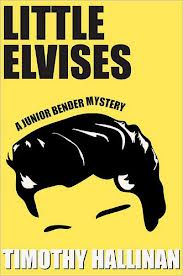Little Elvises by Timothy Hallinan
 Sunday, February 3, 2013 at 11:00AM
Sunday, February 3, 2013 at 11:00AM 
First published digitally in 2011; published by Soho Crime on January 29, 2013
According to a paper written by Junior Bender's thirteen-year-old daughter, dozens of Little Elvises were churned up in Philly in the wake of Elvis Presley. Notable for their looks rather than their ability to carry a tune, they each had their six weeks of fame, performed on American Bandstand, and disappeared into the archives of pop history. The man responsible for the rapid ascension of so many one-hit wonders, Vinnie DiGaudio, has been accused of murdering a tabloid journalist named Derek Bigelow. According to Vinnie, somebody else killed Bigelow before Vinnie could get around to it. Vinnie's nephew happens to be a police detective who threatens to arrest Bender for one of the few burglaries Bender didn't commit unless Bender clears Vinnie's name.
Bender is a burglar who occasionally acts like a cop for other criminals who can't go to the cops with their problems -- hence the detective's belief that Bender is perfect for the job. Bender's investigation touches on the shadier side of the music industry, the dismal state of rock-and-roll between 1959 and 1963, the history of organized crime in Philadelphia, the westward migration and changing ethnicity of organized crime, female professional wrestling, and a number of other interesting topics. Along the way, Bender gets talked into searching for the missing daughter of the woman who manages the motel where he currently resides. He also begins a romance of sorts, although he's having trouble letting go of his feelings for his daughter's mother.
Timothy Hallinan always crafts a nifty plot and Little Elvises is no exception. Bender -- like the reader -- wonders how the 1963 disappearance of Bobby Angel, the most talented of Vinnie's Little Elvises, relates to Bigelow's murder. The answer is creative, credible, and entertaining. The secondary plot, involving the missing daughter, is less of a mystery, but it takes a surprising and satisfying twist in the final chapters.
Bender's character evolves in Little Elvises in response to the prominent role his precocious daughter plays. Bender's difficult family life is an strong hook upon which to rest character development as the series progresses. Hallinan's minor characters are truly characters. If they aren't over-the-top, they're at least dancing on the edge. In a traditional thriller, that would be a drawback, but in a novel that depends so much on humor, the outrageous nature of the supporting characters makes them memorable.
Little Elvises has enough action to keep the story flowing but the real fun comes from Bender's interaction with the other characters. While Hallinan doesn't shortchange the novel's dramatic content, Little Elvises has a playful quality that is reflected in Hallinan's prose. Hallinan has a way of phrasing descriptions ("he had a natural curl in his hair, and the bangs flipped up at the ends with a twee effect that made him look like a hitman for the Campfire Girls") and summing up lives ("He'd set foot on the slippery slope, and the first thing he did was steal a pair of skis so he could get down it faster") that I can't help but admire. The Junior Bender series is a fun counterpoint to Hallinan's heavier Poke Rafferty series. Both series deserve a place on the bookshelves of crime fiction fans.
RECOMMENDED
Reader Comments